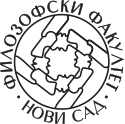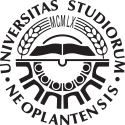15MM008 - Journal, Biography, Autobiography
| Course specification | ||||
|---|---|---|---|---|
| Course title | Journal, Biography, Autobiography | |||
| Acronym | 15MM008 | |||
| Study programme | Hungarian Language and Literature | |||
| Module | ||||
| Type of study | second degree master academic studies | |||
| Lecturer (for classes) | ||||
| Lecturer/Associate (for practice) | ||||
| Lecturer/Associate (for OTC) | ||||
| ESPB | 3.0 | Status | ||
| Condition | Oblik uslovljenosti | |||
| The goal | The students are familiarized with the theory behind autobiography and related genres (diary, biography, memoir, confession), they are presented with an overview of the development history of autobiographical genres in the Hungarian and European literature, and they analyse and compare autobiographical works from the Early Modernism and following the emergence of autonomous literature. | |||
| The outcome | Knowledge of the theories of autobiographical genres, familiarity with the toolset suitable for interpreting autobiographical works (ego-documents) from different periods of European culture. | |||
| Contents | ||||
| Contents of lectures | The overview of newer theories of autobiography and similar genres (Dilthey, Freud, Lacan, Lejeune's “autobiographical pact”, and the theory of Paul De Man: autobiography as “defacement”). The history of autobiography: the notion of persona in the Roman tradition. Augustine: Confessions. The development of individuality in the Middle Ages. The beginnings of the Hungarian autobiography in the 17th and 18th centuries (autobiographies, diaries, and personal notes of aristocratic families). The religious and representative self-formation in the autobiographies of János Kemény and Miklós Bethlen. Augustine-imitation in Francis II Rákóczi’s Confessiones... [Confessions...]. The religious beliefs of Kata Árva Bethlen. The paradigm shift in autobiographical writing: Rousseau’s Confessionsand Giacomo Casanova's memoir. Autobiography in the form of a novel: Ferenc Kazinczy's Fogságom naplója [The Diary of my Captivity]. The interpretation of modern and post-modern autobiographical novels with a protagonist who is fictional or a real historical figure. | |||
| Contents of exercises | ||||
| Literature | ||||
| ||||
| Number of hours per week during the semester/trimester/year | ||||
| Lectures | Exercises | OTC | Study and Research | Other classes |
| 2 | 0 | |||
| Methods of teaching | monological-dialogical method, discussion, interpretive and interactive methods | |||
| Knowledge score (maximum points 100) | ||||
| Pre obligations | Points | Final exam | Points | |
| Activites during lectures | 10 | Test paper | ||
| Practical lessons | Oral examination | 60 | ||
| Projects | ||||
| Colloquia | ||||
| Seminars | 30 | |||

